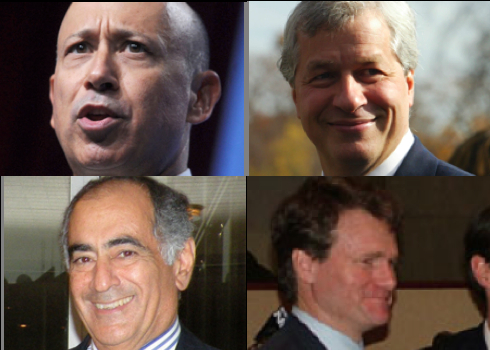What did top banking executives know about the events that led to the near-collapse of the financial system in 2008, and when did they know it? Those are two of the questions that we may start getting answers to this morning, when the commission probing the causes of the crisis holds its first public hearing.
The CEOS of four bailed-out banking behemoths — Lloyd Blankfein of Goldman Sachs, Jamie Dimon of JPMorgan Chase, John Mack of Morgan Stanley, and Brian Moynihan of Bank of America — all will go before the Financial Crisis Inquiry Commission in Washington today.
Phil Angelides, the former California state treasurer who chairs the panel, has said it will consider the banks’ role in creating the crisis, as well as finding out how they became “too big to fail.” He has also said the commission won’t limit its focus to the back-story, but also will look at the government’s response to the crisis — principally its decision to prop up the financial sector with billions of taxpayer dollars.
But some have questioned whether the panel will be able to get to the truth. It has had a slow start, taking six months to hold its first meeting. And it took until this morning to unveil a fully-developed website. Perhaps more important, as we’ve detailed, in order to issue subpoenas the commission requires the sign-off of at least one of the panel’s four Republicans — none of whom has a reputation for aggressively going after the financial industry.
The commission certainly is getting no shortage of advice about how it should proceed this morning. Andrew Ross Sorkin of the New York Times has laid out a few good questions panelists might ask their august witnesses, including:
All of your firms are involved in some form of proprietary trading, or using your own capital to make financial bets, not unlike hedge funds and other private investors. As the recent crisis has shown, these bets can go catastrophically wrong and endanger the global financial system.
Given that the government sent a clear signal in the crisis that it would not let the biggest firms fail, why should taxpayers guarantee this sort of trading? Why should the government backstop what amounts to giant hedge funds inside the walls of your firms? How is such trading helpful to the broader financial system?
And Eliot Spitzer has a few questions of his own. For instance:
What was your firm’s relationship with AIG? How much exposure did you have to AIG? What information did you publicly disclose about that exposure? Did you think AIG’s CDS strategy was “good business”? Do you think we still would have needed to rescue AIG if its derivatives had been centrally cleared, as some in Congress have proposed?
Statements from the commissioners, and opening statements from the witnesses, can be found here. We’ll keep you posted on how things go this morning…






